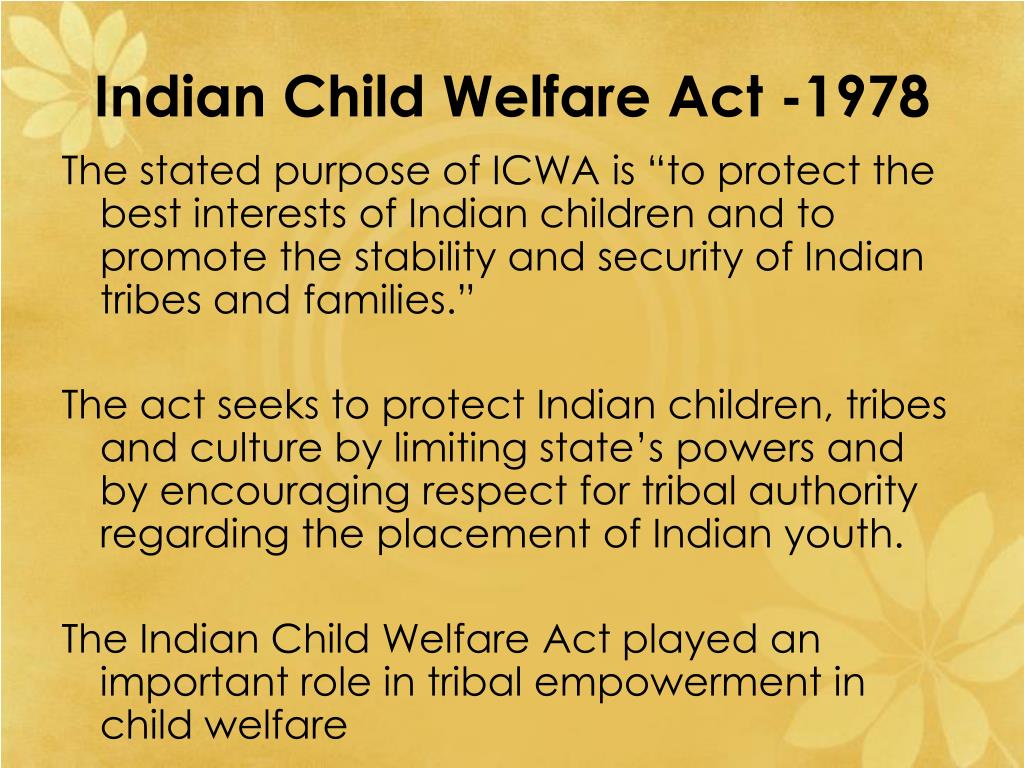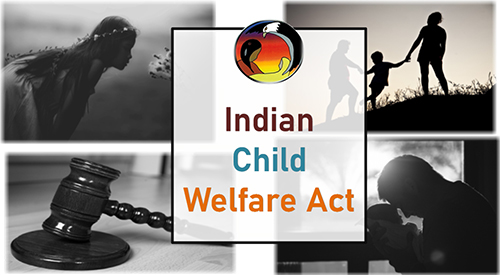
The Unfolding Legacy: Why the Indian Child Welfare Act Remains America’s Crucial Promise to Native Children
(Byline: [Your Name/Journalist’s Name])
Washington D.C. – In the annals of American history, few pieces of legislation carry the weight of both profound historical trauma and the promise of enduring justice quite like the Indian Child Welfare Act (ICWA) of 1978. Often misunderstood, frequently challenged, yet undeniably vital, ICWA stands as a bulwark against the forces that once sought to dismantle Native American families and cultures, and it continues to be a cornerstone of tribal sovereignty in the 21st century.

At its heart, ICWA is a federal law that establishes minimum federal standards for the removal of Native American children from their families and places strict preferences for their placement in foster or adoptive homes. It prioritizes keeping Native children with their families, extended families, or other tribal members, ensuring they maintain connection to their heritage and communities. But to truly grasp ICWA’s importance, one must first understand the devastating historical context from which it emerged.
A Legacy of Erasure: The Pre-ICWA Era
For centuries, the U.S. government pursued policies designed to assimilate Native Americans, often through the forced separation of children from their families and cultures. From the notorious boarding school era, where children were taken, sometimes forcibly, from their homes, stripped of their language and traditions, and subjected to abuse, to the widespread practice of removing Native children into non-Native foster or adoptive homes, the goal was clear: to "kill the Indian to save the man."
By the mid-20th century, this practice had reached crisis proportions. A 1970s study by the Association on American Indian Affairs revealed an alarming truth: between 25% and 35% of all Native American children were being removed from their families. Of those removed, approximately 85% were placed in non-Native homes or institutions, even when fit and willing relatives were available. This wasn’t merely a social welfare issue; it was a continuation of cultural genocide, tearing apart the very fabric of tribal nations.
"Imagine a society where your children could be taken from you, not because you were a bad parent, but because of your race, your culture, your very identity," says Sarah Deer (Muscogee (Creek) Nation), a legal scholar and advocate for Native rights. "That was the reality for Native families before ICWA. It was a systematic attack on the future of our nations."
The consequences were catastrophic: loss of language, identity, traditional knowledge, and profound intergenerational trauma that continues to impact Native communities today. Tribal governments, witnessing the decimation of their future generations, appealed to Congress for intervention.
The Birth of a Promise: ICWA’s Core Principles
In response to this crisis, Congress passed the Indian Child Welfare Act in 1978. Its findings explicitly acknowledged that "there is no resource more vital to the continued existence and integrity of Indian tribes than their children" and that "an alarmingly high percentage of Indian families are broken up by the removal, often unwarranted, of their children."

ICWA established crucial protections and protocols:
- Tribal Jurisdiction: It affirmed the inherent right of tribal courts to have jurisdiction over child welfare cases involving Native children residing or domiciled on their reservations. In cases off-reservation, it established a presumption that jurisdiction should be transferred to the tribal court unless good cause is shown otherwise.
- Placement Preferences: ICWA set clear preferences for the placement of Native children: first with a member of the child’s extended family, second with other members of the child’s tribe, and third with other Native American families. This hierarchy aims to keep children connected to their cultural identity and community.
- Active Efforts: State agencies are required to make "active efforts" to prevent the breakup of Native American families, a higher standard than the "reasonable efforts" typically required in non-ICWA cases. This means providing culturally appropriate services and support to families to keep them together.
- Expert Witness Testimony: In involuntary proceedings, qualified expert witness testimony is required before a Native child can be removed from their home, ensuring that cultural context and tribal perspectives are considered.
"ICWA isn’t just a child welfare law; it’s a tribal sovereignty law," notes Chrissi Ross Nimmo (Cherokee Nation), a tribal attorney. "It recognizes that tribes, like states, have the inherent authority to protect their children and perpetuate their cultures. It’s about respecting nation-to-nation relationships."
Affirming Sovereignty and Cultural Preservation
Beyond the immediate protection of children, ICWA serves a broader, more profound purpose: it reinforces tribal sovereignty and cultural survival. By acknowledging tribal jurisdiction and prioritizing placement within Native communities, ICWA empowers tribes to exercise their self-determination and ensure their cultural continuity.
For a Native child, being raised within their culture means more than just learning traditions; it means understanding their place in a vast, interconnected community, inheriting a unique worldview, and benefiting from millennia of ancestral knowledge. It’s about identity, belonging, and healing from historical trauma. Without this connection, the cycle of cultural loss continues.
"When our children grow up within their families and communities, they learn their language, their ceremonies, their stories," says a tribal elder from the Navajo Nation, who wished to remain anonymous to protect their family’s privacy. "They learn who they are, where they come from. This is not just good for the child; it’s essential for the survival of our nation."
ICWA has been instrumental in reuniting families, preventing unnecessary removals, and ensuring that countless Native children have grown up with a strong sense of identity. It has fostered collaboration between state child welfare agencies and tribal nations, leading to better outcomes for Native children and families when the law is properly implemented.
The Ongoing Battle: Legal Challenges and Misconceptions
Despite its successes and critical importance, ICWA has faced persistent legal challenges, particularly in recent years. The most prominent of these was Brackeen v. Haaland, a case that reached the U.S. Supreme Court in 2022. The plaintiffs, a non-Native couple seeking to adopt a Native child, argued that ICWA was unconstitutional, primarily on two grounds:
- Equal Protection: They claimed ICWA violates the Equal Protection Clause of the Fifth and Fourteenth Amendments by creating race-based classifications that discriminate against non-Native individuals.
- Anti-Commandeering Doctrine: They argued that ICWA "commandeers" state agencies by forcing them to implement federal policy, thereby infringing on state sovereignty.
These arguments, however, fundamentally misunderstand the legal framework of federal Indian law. As the Supreme Court has consistently affirmed, Native American tribes are not racial groups but distinct political entities with a unique sovereign status recognized by treaties and the U.S. Constitution. Therefore, laws like ICWA, which treat Native Americans differently, do so based on their political relationship with the federal government, not on race.
"The idea that ICWA is race-based is a dangerous mischaracterization," explains Elizabeth Reese (Nambé Pueblo), a Stanford Law School professor specializing in federal Indian law. "It ignores over 200 years of Supreme Court precedent recognizing tribes as sovereign nations. ICWA is about protecting the political integrity of tribes, not about racial discrimination."
In June 2023, the Supreme Court, in a 7-2 decision, affirmed ICWA’s constitutionality, rejecting the challenges to its core provisions. This was a monumental victory for tribal nations and Native children, but the battle is far from over. Lower court challenges and legislative attacks continue to emerge, fueled by a lack of understanding and, at times, outright hostility to tribal sovereignty.
The Stakes of the Future
The implications of overturning or significantly weakening ICWA extend far beyond child welfare. Such an action would erode the very foundation of tribal sovereignty, undermine the government-to-government relationship between the U.S. and tribal nations, and open the door to challenges against other critical federal Indian laws.
More importantly, it would directly harm Native children. Without ICWA, the gains made in keeping Native families together would be jeopardized, potentially returning to the devastating rates of family separation seen in the pre-ICWA era. It would further exacerbate the intergenerational trauma within Native communities, leading to increased rates of mental health issues, substance abuse, and cultural disconnection.
For Native children, ICWA offers the promise of a future where they can grow up knowing who they are, where they come from, and the strength of their heritage. It offers a chance at healing, continuity, and resilience.
A Continuing Commitment
The Indian Child Welfare Act is more than just a piece of legislation; it is a moral imperative. It represents a commitment, however belated, to rectify historical injustices and ensure the future vitality of tribal nations. It acknowledges that the best interest of a Native child is inextricably linked to their connection to their family, community, and culture.
As tribal nations continue to assert their sovereignty and rebuild their communities, ICWA remains an indispensable tool. It reminds us that justice is not merely about righting past wrongs, but about creating conditions for a more equitable and respectful future. The unfolding legacy of ICWA is one of hope, resilience, and the enduring power of family and cultural connection—a promise that America must continue to uphold for generations to come.


